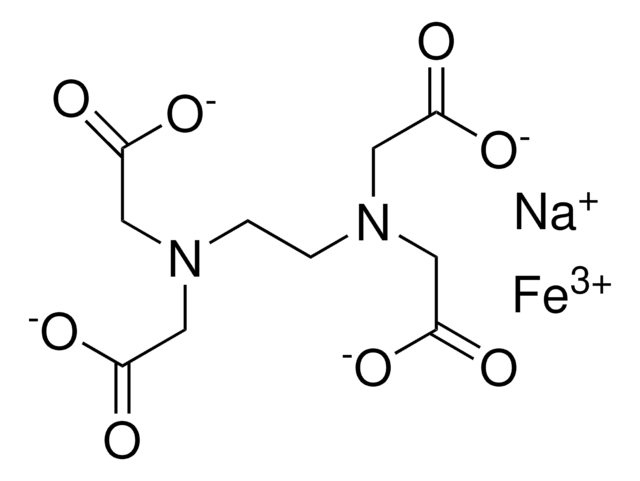1.02123
Calcium nitrate tetrahydrate
99.95 Suprapur®
Synonym(s):
Calcium nitrate tetrahydrate
About This Item
Recommended Products
grade
for inorganic trace analysis
Quality Level
Assay
99.95%
form
solid
potency
3900 mg/kg LD50, oral (Rat)
pH
5.0-7.0 (25 °C, 50 g/L in H2O)
mp
45 °C
solubility
2710 g/L
density
1.82 g/cm3 at 20 °C
bulk density
1000 kg/m3
storage temp.
2-30°C
InChI
1S/Ca.2HNO3.4H2O/c;2*2-1(3)4;;;;/h;2*(H,2,3,4);4*1H2/q+2;;;;;;
InChI key
DKCJOKYHYIAZQH-UHFFFAOYSA-N
Related Categories
Application
- Calcium Nitrate Tetrahydrate in Hydroponics: Enhances the growth and nutritional quality of pepper plants by optimizing nitrogen forms and dissolved oxygen levels in nutrient solutions, demonstrating its crucial role in plant nutrient research and hydroponic agriculture systems (Roosta HR, 2024).
- Calcium Nitrate Tetrahydrate in Environmental Applications: Utilized in real-time applications for NO(x)-sorption on particulate calcium carbonate surface-flow filters exposed to combustion exhaust, showcasing its potential in reducing environmental pollution and improving air quality (Barać N, et al., 2024).
- Bioglass Production Using Organic Calcium Sources: Details the ecofriendly and scalable production of bioglass using calcium nitrate tetrahydrate, which enhances bioactivity for tissue repair, pointing to its significant applications in biomaterials and regenerative medicine (Chen Y, et al., 2024).
- Calcium Nitrate Tetrahydrate in Plant Stress Mitigation: Investigates the role of exogenous calcium nitrate tetrahydrate in improving the tolerance of tomato plants to environmental stresses, thereby contributing to more resilient agricultural practices (Yang L, et al., 2024).
- Calcium Nitrate Tetrahydrate in Wastewater Treatment: Demonstrates the application of calcium nitrate tetrahydrate in nutrient recovery systems for hydroponics, analyzing its efficiency in recycling and reducing the environmental impact of wastewater (Hofmann AH, et al., 2024).
Analysis Note
Assay (complexometric): ≥ 99.0 %
Chloride (Cl): ≤ 20 ppm
Phosphate (PO₄): ≤ 10 ppm
Sulfate (SO₄): ≤ 20 ppm
Al (Aluminium): ≤ 0.05 ppm
Ba (Barium): ≤ 5 ppm
Cd (Cadmium): ≤ 0.005 ppm
Ce (Cerium): ≤ 0.010 ppm
Co (Cobalt): ≤ 0.005 ppm
Cr (Chromium): ≤ 0.010 ppm
Cu (Copper): ≤ 0.005 ppm
Eu (Europium): ≤ 0.010 ppm
Fe (Iron): ≤ 0.05 ppm
Hg (Mercury): ≤ 0.010 ppm
K (Potassium): ≤ 1.0 ppm
La (Lanthanum): ≤ 0.010 ppm
Li (Lithium): ≤ 2.0 ppm
Mg (Magnesium): ≤ 2.0 ppm
Mn (Manganese): ≤ 0.010 ppm
Na (Sodium): ≤ 5 ppm
Ni (Nickel): ≤ 0.010 ppm
Pb (Lead): ≤ 0.010 ppm
Rb (Rubidium): ≤ 10 ppm
Sc (Scandium): ≤ 0.010 ppm
Sm (Samarium): ≤ 0.010 ppm
Sr (Strontium): ≤ 50 ppm
Tl (Thallium): ≤ 0.005 ppm
Y (Yttrium): ≤ 0.010 ppm
Yb (Ytterbium): ≤ 0.010 ppm
Zn (Zinc): ≤ 0.010 ppm
Legal Information
Signal Word
Danger
Hazard Statements
Precautionary Statements
Hazard Classifications
Acute Tox. 4 Oral - Eye Dam. 1
Storage Class Code
13 - Non Combustible Solids
WGK
WGK 1
Certificates of Analysis (COA)
Search for Certificates of Analysis (COA) by entering the products Lot/Batch Number. Lot and Batch Numbers can be found on a product’s label following the words ‘Lot’ or ‘Batch’.
Already Own This Product?
Find documentation for the products that you have recently purchased in the Document Library.
Customers Also Viewed
Our team of scientists has experience in all areas of research including Life Science, Material Science, Chemical Synthesis, Chromatography, Analytical and many others.
Contact Technical Service










